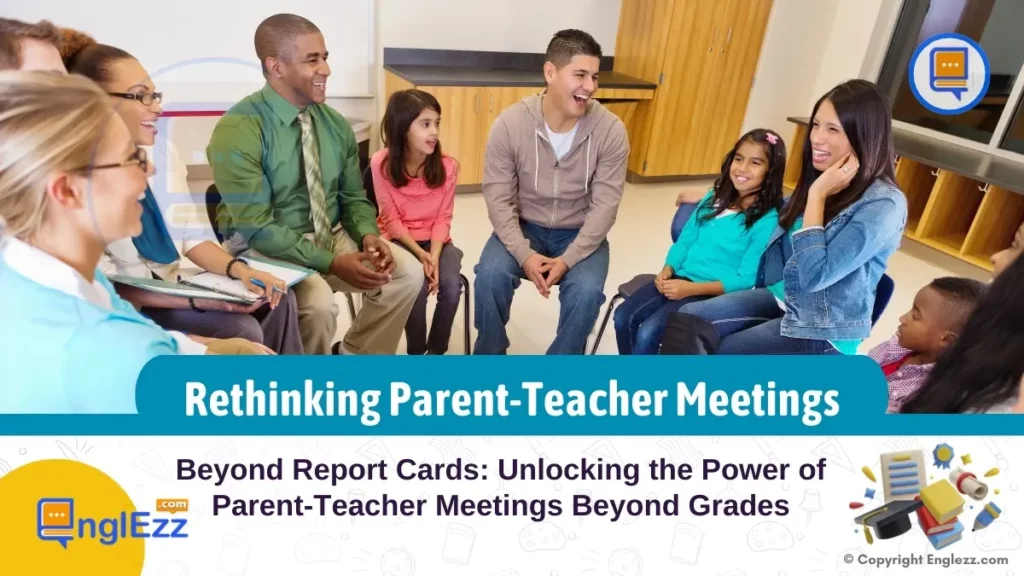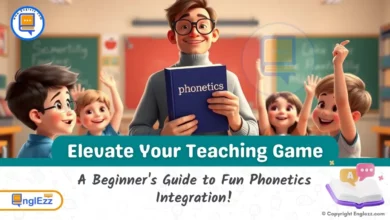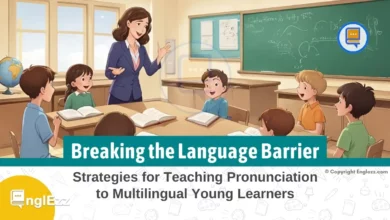In the symphony of education, where students are the melodies and teachers the conductors, parent-teacher meetings stand as a crucial crescendo. Yet, beyond the commonplace discussions on grades lies an untapped reservoir of transformative potential waiting to be unleashed. Imagine a realm where these meetings transcend mere numerical assessments and dance into the harmonious realms of holistic student development—this is the paradigm shift we invite you to explore.
Table of Contents
- Beyond Report Cards: Rethinking Parent-Teacher Meetings
- The Importance of Holistic Approaches
- Empowering Parental Engagement
- Personalized Learning Journeys
- Investing in Comprehensive Growth
- Celebrating Student Progress Beyond Grades
- Transformative Partnerships for Holistic Student Success
- Transformative Partnerships for Holistic Student Success
- FAQs:
- Q: Why should parent-teacher meetings focus on holistic student development?
- Q: How can parents actively participate in their child’s academic and personal growth during these meetings?
- Q: What role does positive communication play in enhancing the outcomes of parent-teacher interactions?
- Q: In what ways can schools prioritize comprehensive student growth over solely academic achievements?
- Q: How can educators celebrate diverse forms of student achievement beyond traditional grading systems?
Beyond Report Cards: Rethinking Parent-Teacher Meetings
As educators, parents, administrators, and policymakers converge in this pivotal space, there emerges a collective call for a renaissance in educational interactions. It beckons us towards embracing a more profound understanding – one that cherishes not only academic milestones but also nurtures the roots of social-emotional growth, personal resilience, and individualized learning pathways.

Let us embark on this journey together not merely as spectators but as active participants in sculpting well-rounded individuals capable of flourishing in a world that demands more than just numerical proficiency. Join us as we unlock the power of parent-teacher meetings beyond grades and pioneer a new narrative focused on holistic student success. The baton is poised; are you ready to conduct symphonies of comprehensive growth with us?
The Importance of Holistic Approaches
In reimagining the landscape of parent-teacher meetings, a pivotal shift towards holistic development emerges as a beacon of transformation. While academic achievement remains essential, placing equal emphasis on social-emotional growth during these interactions paves the way for more comprehensive student success. Imagine a scenario where parents and educators engage in dialogue not just about grades, but also about nurturing qualities like resilience, empathy, and self-awareness. By integrating discussions on emotional well-being into parent-teacher meetings, a powerful foundation is laid for students to thrive not only academically but also socially and emotionally.
Personalized learning plans tailored to individual student needs unlock a realm of limitless possibilities within educational settings. By acknowledging that each child learns uniquely and has distinct strengths and challenges, educators can craft bespoke strategies that cater to diverse learning styles.
- Picture a meeting where teacher feedback combines with parental insights to co-create personalized paths for students with varying aspirations and requirements. Such collaborative efforts not only bolster academic performance but also foster a sense of ownership in students regarding their educational journey.
Extracurricular involvement acts as a dynamic force in shaping well-rounded individuals beyond classroom confines. Consider a setting where parent-teacher meetings encompass discussions on how extracurricular activities like sports, arts, or community service bolster character development alongside academic progress. These engagements not only enhance cognitive skills but also instill values such as teamwork, discipline, and leadership. Integrating such conversations into parent-teacher interactions shifts the focus from mere grades to nurturing individuals who are equipped to navigate life’s myriad challenges with confidence and agility.
Encourage parents and educators to engage in open, honest conversations that go beyond traditional academic updates. By fostering an environment where both parties can share insights into a student’s social-emotional growth, interests, and challenges, these discussions can lead to more holistic support strategies. For example, instead of simply discussing test scores, consider talking about a student’s resilience in the face of setbacks or their leadership skills displayed during group projects.
By embracing holistic approaches that transcend traditional grade-centric dialogues, parent-teacher meetings evolve into potent vehicles for nurturing multifaceted student growth. As we recalibrate our perspectives to embrace the richness of social-emotional development, personalized learning pathways, and extracurricular enrichment in these interactions, we embark on an inspiring journey towards sculpting resilient, adaptable learners poised for success in all facets of life.
Empowering Parental Engagement
Parental engagement plays a pivotal role in shaping a child’s academic and personal growth. By actively involving parents in setting individualized goals during parent-teacher meetings, a collaborative atmosphere is created where the focus shifts from grades to holistic development. For instance, instead of solely discussing test scores, educators can work with parents to establish goals that encompass not only academic achievements but also social-emotional milestones. This approach fosters a sense of shared responsibility between schools and families in nurturing well-rounded individuals.
To support their child’s holistic development beyond school hours, parents can implement strategies that promote continuous learning and growth. Encouraging reading habits at home, engaging in constructive conversations about values and character traits, or exploring extracurricular activities that align with the child’s interests are all ways in which parents can enrich their child’s overall development. By providing resources and guidance on how to incorporate these practices into daily routines, educators empower parents to actively contribute to their child’s educational journey outside the classroom.

Research consistently shows that parental involvement positively influences student success both academically and socially. When parents engage in setting goals for their child’s development, offer support outside of school hours, and participate in open communication with educators, students experience enhanced motivation, self-esteem, and overall well-being. By recognizing the significant impact of involved parents on student outcomes, schools can foster a culture where collaborative partnerships between teachers and families thrive, ultimately benefiting the students’ comprehensive growth and success inside and outside the classroom.
Fostering positive communication between educators and parents during parent-teacher meetings is essential for creating a supportive environment that nurtures holistic student development. Effective communication techniques involve not only discussing academic progress but also addressing social-emotional growth, extracurricular engagement, and personal aspirations. By initiating conversations that delve into diverse aspects of student development, educators can provide parents with a more comprehensive understanding of their child’s journey through school.
Creating an inclusive environment during parent-teacher discussions is key to ensuring that all voices are heard and valued. Encouraging open dialogue where both educators and parents actively listen to each other’s perspectives fosters mutual respect and understanding. It allows for collaborative goal-setting that considers the unique needs and strengths of each student. By acknowledging the expertise and insights that parents bring about their child’s personality, interests, and challenges, educators can tailor their strategies to support well-rounded growth effectively.
Open dialogue plays a pivotal role in building strong relationships between educators, parents, and students. Transparent communication fosters trust and collaboration, leading to a shared commitment to the success of every learner. When educators engage in meaningful conversations with parents that go beyond grades – focusing on character development, resilience-building, and skill enhancement – they demonstrate a deep investment in nurturing the whole child. This partnership creates a foundation for sustained student growth both academically and personally, fostering a supportive community where everyone works together towards common goals.
Personalized Learning Journeys
In the realm of education, personalization is a powerful tool that can unlock the unique potential of every student. During parent-teacher meetings, showcasing examples of successful personalized learning approaches can highlight how individualized strategies go beyond traditional methods to address specific challenges and optimize learning outcomes. For instance, imagine a scenario where a student struggles with math concepts but excels in artistic expression.
Encourage collaborative goal-setting during parent-teacher meetings to ensure that each student’s unique needs are addressed holistically. This could involve creating personalized learning plans that not only focus on academic improvement but also on areas like character development, emotional intelligence, and extracurricular involvement. By involving parents in this process, they become active partners in fostering their child’s comprehensive growth. An example could be setting goals related to improving time management skills or enhancing creativity outside of the standard curriculum.
By tailoring their learning journey to incorporate art-based activities to reinforce mathematical principles, educators and parents can create a personalized approach that not only improves academic performance but also nurtures the student’s passion for creativity.
Demonstrating how tailored strategies can address individual challenges within the context of parent-teacher meetings underscores the importance of collaboration between all stakeholders involved in a child’s education. By actively involving parents in co-designing personalized learning paths for students, educators can harness valuable insights about each child’s strengths, preferences, and areas for growth. This collaborative effort fosters a sense of shared responsibility for the child’s holistic development and ensures that educational plans are truly reflective of the student’s needs and aspirations.
Encouraging educators to collaborate with parents goes beyond mere partnership; it signifies a shift towards building a strong community invested in nurturing each child’s potential. By fostering these meaningful connections through personalized learning journeys, schools pave the way for comprehensive growth and success among students.
- Imagine a school where teachers engage with parents to develop tailor-made strategies that consider not just academic goals but also social-emotional well-being and future career aspirations.
Such initiatives not only enhance student engagement and motivation but also instill a deep sense of purpose and belonging within the educational ecosystem.
By amplifying the benefits of personalized learning journeys during parent-teacher meetings, educators inspire innovation in teaching practices while reinforcing the value of individuality in education. Embracing this approach cultivates an environment where every student feels seen, heard, and supported on their unique path to success. Through collaborative efforts between educators, parents, and students, personalized learning becomes more than just a concept – it becomes a transformative force that shapes lifelong learners equipped to navigate an ever-evolving world with confidence and resilience.
Investing in Comprehensive Growth
As educators and parents, it is crucial to recognize that a child’s growth encompasses far more than just academic achievements. By advocating for schools to prioritize comprehensive growth, we aim to foster individuals who excel not only in their studies but also in their social interactions, emotional intelligence, and personal development.
One effective strategy to achieve this holistic approach is by integrating social-emotional learning into daily classroom practices and extending these principles into the home environment. When students learn to navigate their emotions, communicate effectively, and cultivate empathy, they are better equipped to succeed not just academically but also in life beyond the classroom.
The long-term benefits of nurturing well-rounded individuals through collaborative efforts between educators and parents cannot be understated. Imagine a scenario where a student struggles academically due to personal challenges at home; through a combined effort between teachers and parents focusing on both academic support and emotional well-being, that student begins to thrive academically as their emotional needs are met.
This synergy between school and home environments creates a supportive ecosystem where students are encouraged not just to excel in standardized tests but also to grow into resilient, empathetic individuals capable of facing life’s challenges with grace.
Shift the focus from solely celebrating high grades to acknowledging progress in different facets of a student’s development. Encourage parents and educators to celebrate achievements such as improved communication skills, acts of kindness towards peers, artistic accomplishments, or community service initiatives. By expanding the definition of success beyond grades, students are motivated to excel in various areas of their lives, leading to a more enriching educational experience overall. For instance, hosting recognition events for students who demonstrate exceptional teamwork in group projects or show dedication to community service can inspire holistic growth beyond academic performance alone.
By emphasizing comprehensive growth over solely academic achievements, we shift the focus from grades as the sole measure of success to cultivating individuals who possess a rich tapestry of skills and attributes. This intentional approach nurtures students’ abilities to communicate effectively, work collaboratively, think creatively, and navigate complex emotions – all essential skills for thriving in today’s interconnected world.
As schools embrace this paradigm shift towards holistic development, they pave the way for students who graduate not only academically proficient but also emotionally intelligent and socially adept – truly preparing them for success in all facets of life.
Celebrating Student Progress Beyond Grades
In the ever-evolving landscape of education, it is crucial to acknowledge and celebrate student progress through a lens that extends beyond traditional grading systems. While grades are a valuable measure of academic proficiency, they do not encompass the full spectrum of a student’s capabilities and achievements. By recognizing diverse forms of accomplishment, educators, parents, and policymakers can foster a culture that values qualities such as perseverance, creativity, resilience, and interpersonal skills alongside academic excellence.
Imagine a scenario where a student who struggled with public speaking at the beginning of the year confidently delivers a heartfelt presentation on an important social issue in front of their peers. Instead of solely focusing on the final grade for the presentation, celebrating this growth in communication skills underscores the importance of personal development within educational settings. Highlighting these moments not only boosts students’ self-esteem but also encourages them to continue expanding their skill set beyond what can be measured by standardized tests.

By promoting an environment that treasures multifaceted accomplishments, schools can cultivate well-rounded individuals equipped to navigate challenges in various aspects of life. Embracing holistic measures of success allows students to recognize their unique strengths and encourages them to explore new opportunities for growth. Through collaborative efforts among educators, parents, and policymakers in re-evaluating success metrics, we pave the way for comprehensive student achievement that goes beyond numerical grades – a testament to the power of embracing diverse forms of progress in education.
Transformative Partnerships for Holistic Student Success
In rethinking parent-teacher meetings to unlock the power beyond grades, a transformative partnership emerges, fostering holistic student success. By shifting the focus from traditional report cards to celebrating diverse forms of student achievement, educators and parents create an environment that values personal growth, resilience, creativity, and interpersonal skills alongside academic excellence. This shift in mindset transcends numerical grades, embracing a more comprehensive view of education where students thrive not just academically but also emotionally and socially.
Imagine a parent-teacher meeting where discussions extend beyond test scores to encompass a child’s unique talents, passions, and growth areas. In this collaborative setting, personalized learning journeys are crafted with input from both educators and parents, ensuring that each student receives tailored support to reach their full potential. By investing in these customized pathways for students’ development, schools nurture individuals who excel not only in academics but also in character and well-being.
As schools prioritize comprehensive growth over mere academic achievements, they pave the way for a new era of education that values the whole child. By integrating social-emotional learning into daily classroom practices and home environments through joint efforts between educators and parents, students receive the crucial support they need to navigate challenges confidently. These transformative partnerships foster an educational landscape where success is measured not just by grades but by the profound impact on students’ lives, shaping them into resilient, creative individuals ready to contribute meaningfully to society.
Transformative Partnerships for Holistic Student Success
In exploring the transformative potential of parent-teacher meetings beyond traditional grade discussions, we have delved into a realm where student development blossoms in vibrant hues beyond just numerical evaluations. By advocating for a shift towards holistic approaches that encompass social-emotional growth, personalized learning plans, and comprehensive engagement with parents, educators are poised to unlock the true power of these essential partnerships.

Fostering a community where diverse forms of achievement are celebrated and wellbeing is nurtured paves the way for students to thrive not just academically, but as well-rounded individuals equipped for success in all aspects of life.
As we journey through this reimagined landscape of education – one that values empathy, collaboration, and growth – it becomes evident that the quest for holistic student success is not merely an aspiration but an imperative.
Let us embrace these fresh perspectives on parent-teacher interactions, paving the way for comprehensive growth that transcends conventional metrics. Together, as a united front committed to empowering our young learners, we can forge ahead with unwavering dedication towards laying the groundwork for a brighter future rooted in holistic student success.
FAQs:
Q: Why should parent-teacher meetings focus on holistic student development?
A: Holistic approaches address the overall growth of students by considering their social-emotional well-being and personalized learning needs, leading to more comprehensive support and success.
Q: How can parents actively participate in their child’s academic and personal growth during these meetings?
A: Parents can set individualized goals for their child, support their multifaceted development at home, and engage constructively with educators to create a collaborative support system.
Q: What role does positive communication play in enhancing the outcomes of parent-teacher interactions?
A: Open dialogue fosters understanding between all stakeholders involved—educators, parents, and students—and builds strong relationships based on mutual respect and shared goals.
Q: In what ways can schools prioritize comprehensive student growth over solely academic achievements?
A: By integrating social-emotional learning into daily practices at school and home environments, institutions can nurture well-rounded individuals equipped with essential life skills alongside academic excellence.
Q: How can educators celebrate diverse forms of student achievement beyond traditional grading systems?
A: Recognizing qualities like perseverance, creativity, resilience, and interpersonal skills alongside academics cultivates a culture that values multifaceted accomplishments honed through collective efforts.









Rethinking Parent-Teacher Meetings? Discover innovative strategies to enhance communication and collaboration for your child’s success today!